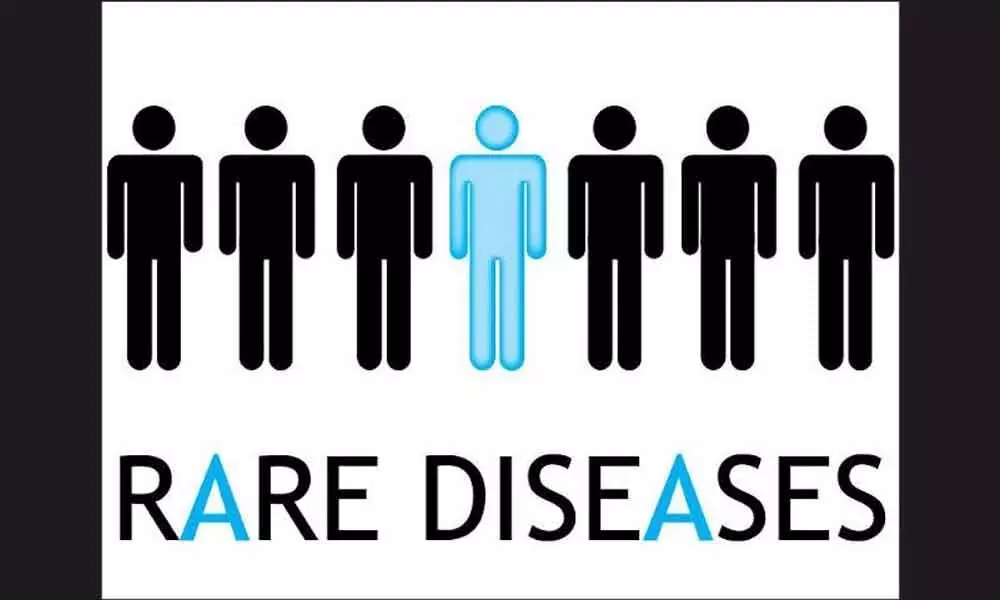Live
- Unselfishness is a Lie
- ICTPL welcomes maiden vessel MV KSL Fuyang
- BJP leaders mock Rahul's speech
- Analysing Happiness
- Two-day ToT organised for trainers
- Savarkar preferred Manusmriti to Constitution: Rahul
- Daily Horoscope for 15 December 2024: Embrace Today’s Insights of Your Zodiac Sign and Unlock Your Potential.
- Beyond The Flames
- CM warns officials of stringent action
- NDA alliance candidates win all seats
Just In
Centre to pay one-time `15 lakh for poor with rare disease


The government will provide a financial support of up to Rs 15 lakh under its Rashtriya Arogaya Nidhi scheme for one-time treatment of rare diseases, according to the much-awaited draft Rare Diseases Policy.
New Delhi: The government will provide a financial support of up to Rs 15 lakh under its Rashtriya Arogaya Nidhi scheme for one-time treatment of rare diseases, according to the much-awaited draft Rare Diseases Policy.
Under the draft National Policy for Rare Diseases released on Monday, beneficiaries would not be limited to Below Poverty Line families, but will also cover 40 per cent of the population eligible as per norms of the Ayushman Bharat-Pradhan Mantri Jan Arogya Yojana for their treatment in government tertiary hospitals only.
The Union Health Ministry intends to notify certain medical institutes as Centers of Excellence for Rare Diseases. These include AIIMS, New Delhi, Maulana Azad Medical College, New Delhi, Sanjay Gandhi Post Graduate Institute of Medical Sciences, Lucknow and Post Graduate Institute of Medical Education and Research, Chandigarh.
"The cost of treatment of patient in these centres of excellence will be met out of donations received through the online digital platform," according to the draft policy.
The Ministry has put up the draft policy on its website and sought comments and suggestions over it by February 10. Rare diseases categorised under Group 1, such as Lysosomal Storage Disorders (LSDs), immune deficiency disorders, chronic granulomatous disease, osteopetrosis, Fabry's disease and liver or kidney transplant, will be funded under the scheme.
The policy cited "resource constraints" to provide financial assistance to rare diseases like Gaucher's disease, Spinal Muscular Atrophy, Hurler Syndrome and Wolman disease that require lifelong treatment.
"The government will endeavour to create alternate funding mechanism through setting up a digital platform for voluntary individual and corporate donors to contribute to the treatment cost of patients of rare diseases," the draft said.
Rare diseases are severe and chronic illnesses and often life-threatening. Patients suffering from rare diseases, especially Lysosomal Storage Disorders (LSDs), often lead a very incapacitating life. There are about 50 LSDs out of which only five have approved treatment options available in India.
The Ministry of Health had formulated a National Policy for Treatment of Rare Diseases (NPTRD) in July, 2017. Implementation of the policy was, however, faced with certain challenges.
A limiting factor in its implementation was bringing states on board and lack of clarity on how much government could support in terms of tertiary care. When the policy was shared with state governments, issues such as cost effectiveness of interventions for rare disease, the sharing of expenditure between central and state governments, flexibility to state governments to accept the policy or change it according to their situation, were raised.
The policy had implementation challenges and gaps, including the issue of cost effectiveness of supporting such health interventions for resources limited situation, which made it not feasible to implement.
Pending reframing the policy, the earlier policy has been kept in beyance vide a non-statutory gazette notification dated December 18, 2018, till the revised policy is issued or till further orders, whichever is earlier, the draft document states. Holding that rare diseases place a major economic burden on any country and especially in resource-constrained settings, the draft policy states that at present very few pharmaceutical companies are manufacturing drugs for rare diseases globally and there are no domestic manufacturers in India.
Due to high cost, the government has not been able to provide these drugs for free. It is estimated that for a child weighing 10 kg, the annual cost of treatment for some rare diseases may vary from Rs 10 lakh to more than 1 crore per year, with drug dose and cost increasing with age.
So far, only about 450 diseases have been recorded in India from tertiary care hospitals that are globally considered as rare diseases, according to the draft policy. The most commonly reported diseases include Haemophilia, Thalassemia, Sickle-cell Anaemia and Primary Immuno Deficiency in children, auto-immune diseases, Lysosomal storage disorders such as Pompe disease, Hirschsprung disease, Gaucher's disease, Cystic Fibrosis, Hemangiomas and certain forms of muscular dystrophies.
Keeping in view the lack of availability of epidemiological data on rare diseases, constraints on resources and competing health priorities, the government is in the process of setting up a National Registry for Rare Diseases at ICMR with the objective of creating a database of various rare diseases. Steps have already been taken in this direction by ICMR.
Over a period of time, the registry is expected to yield enough information to be able to arrive at a definition of rare diseases best suited to the country.

© 2024 Hyderabad Media House Limited/The Hans India. All rights reserved. Powered by hocalwire.com






